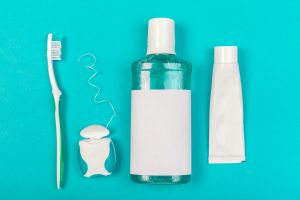 It’s no secret that brushing your teeth twice and flossing at least once every day are the cornerstones of preventing most common dental diseases. Yet, even patients who diligently stick to that routine may find themselves faced with a developing issue, such as gum disease, and the need to address it. The reason is often because of inconsistency. It only takes skipping one session with your toothbrush for harmful oral bacteria to build a presence on your teeth. For patients in Encinitas/San Diego, gum disease can also occur because they don’t realize how to brush and floss with the goal of preventing it in mind. (more…)
It’s no secret that brushing your teeth twice and flossing at least once every day are the cornerstones of preventing most common dental diseases. Yet, even patients who diligently stick to that routine may find themselves faced with a developing issue, such as gum disease, and the need to address it. The reason is often because of inconsistency. It only takes skipping one session with your toothbrush for harmful oral bacteria to build a presence on your teeth. For patients in Encinitas/San Diego, gum disease can also occur because they don’t realize how to brush and floss with the goal of preventing it in mind. (more…)
Is Periodontal Disease Really Preventable?
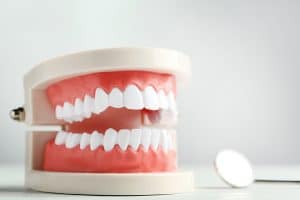 Maintaining a healthy smile is typically simple with a good dental hygiene and preventive dental care routine. Yet, sometimes, that maintenance requires addressing specific concerns, such as periodontal (gum) disease, before they’re allowed to cause significant damage to your teeth and oral tissues. Such issues occur commonly – periodontal disease alone affects over 80% of adults in the U.S. – but they don’t always have to. In fact, despite the frequent occurrence of gum disease, many patients in Encinitas/San Diego, successfully prevent it from developing with help from their dentists and periodontal experts. (more…)
Maintaining a healthy smile is typically simple with a good dental hygiene and preventive dental care routine. Yet, sometimes, that maintenance requires addressing specific concerns, such as periodontal (gum) disease, before they’re allowed to cause significant damage to your teeth and oral tissues. Such issues occur commonly – periodontal disease alone affects over 80% of adults in the U.S. – but they don’t always have to. In fact, despite the frequent occurrence of gum disease, many patients in Encinitas/San Diego, successfully prevent it from developing with help from their dentists and periodontal experts. (more…)
Important Facts About Gum Recession
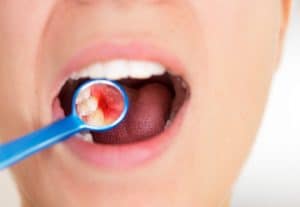 Your gums are the soft periodontal tissues that cover your dental ridges and help protect the roots of your teeth. They also play an important role in your smile’s appearance, which is why paying close attention to them could help you detect when something is wrong with your periodontal health. For example, patients in Encinitas/San Diego who exhibit signs of gum recession, or the separation of periodontal tissues from teeth, are often at risk of experiencing severe periodontal disease if they don’t seek treatment in time. Fortunately, expert treatment can help you address gum recession and allow the tissues to heal to protect your long-term periodontal health. (more…)
Your gums are the soft periodontal tissues that cover your dental ridges and help protect the roots of your teeth. They also play an important role in your smile’s appearance, which is why paying close attention to them could help you detect when something is wrong with your periodontal health. For example, patients in Encinitas/San Diego who exhibit signs of gum recession, or the separation of periodontal tissues from teeth, are often at risk of experiencing severe periodontal disease if they don’t seek treatment in time. Fortunately, expert treatment can help you address gum recession and allow the tissues to heal to protect your long-term periodontal health. (more…)
Things You Might Not Know About Tooth Loss
 Many patients have lost teeth or will in the future, and because it can affect virtually anyone, tooth loss is often thought to be inevitable. The truth, though, is that it doesn’t have to be, and the fact that you have a good chance of preventing tooth loss isn’t the only thing that’s often misunderstood about it. For patients throughout the Encinitas/San Diego community, preventing or dealing with tooth loss is often simpler than expected, especially with the right care and maintenance from your oral or periodontal health expert. (more…)
Many patients have lost teeth or will in the future, and because it can affect virtually anyone, tooth loss is often thought to be inevitable. The truth, though, is that it doesn’t have to be, and the fact that you have a good chance of preventing tooth loss isn’t the only thing that’s often misunderstood about it. For patients throughout the Encinitas/San Diego community, preventing or dealing with tooth loss is often simpler than expected, especially with the right care and maintenance from your oral or periodontal health expert. (more…)
A Few Holistic Ways to Improve Your Periodontal Health
 Periodontal disease occurs in several different stages ranging from minor (gingivitis) to severe (periodontitis). Yet, the disease typically develops the same way – harmful oral bacteria overwhelm your gums, working their way underneath them and infecting the tissues. The level of damage the disease causes depends on the stage that it’s in when it’s treated, and the extent of treatment depends on how severe your periodontal disease is. For many patients in Encinitas/San Diego, that treatment can be more natural and minimally invasive thanks to the help of advanced, holistic periodontal treatment options. (more…)
Periodontal disease occurs in several different stages ranging from minor (gingivitis) to severe (periodontitis). Yet, the disease typically develops the same way – harmful oral bacteria overwhelm your gums, working their way underneath them and infecting the tissues. The level of damage the disease causes depends on the stage that it’s in when it’s treated, and the extent of treatment depends on how severe your periodontal disease is. For many patients in Encinitas/San Diego, that treatment can be more natural and minimally invasive thanks to the help of advanced, holistic periodontal treatment options. (more…)
What Could You Eat to Improve Your Oral Health?
 The food that you eat doesn’t just fuel your own body; it also fuels the oral bacteria that reside naturally in your mouth. The substances that many of the bacteria produce as a result of metabolizing nutrients are the main building blocks behind progressive issues like periodontal disease. However, not everything you eat is a threat to your oral health. In fact, like the rest of your body, your teeth, gums, and oral structures rely on a healthy supply of the right minerals and nutrients, and a lack of them is why some patients in Encinitas/San Diego may have trouble preventing dental disease. (more…)
The food that you eat doesn’t just fuel your own body; it also fuels the oral bacteria that reside naturally in your mouth. The substances that many of the bacteria produce as a result of metabolizing nutrients are the main building blocks behind progressive issues like periodontal disease. However, not everything you eat is a threat to your oral health. In fact, like the rest of your body, your teeth, gums, and oral structures rely on a healthy supply of the right minerals and nutrients, and a lack of them is why some patients in Encinitas/San Diego may have trouble preventing dental disease. (more…)
Things that Can Affect Your Candidacy for Dental Implants
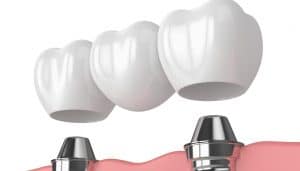 Most patients who have lost one or more teeth make excellent candidates for dental implants. The prosthetic posts, which are inserted into your jawbone, are biocompatible and designed for a healthy jawbone to fuse to them. However, there are certain things that could impact your candidacy for dental implants, such as the state of your dental health and any considerations that affect it. To help more patients in Encinitas/San Diego benefit from dental implants, we explain what some of those things are and how we can help you address them to boost your candidacy for dental implant placement. (more…)
Most patients who have lost one or more teeth make excellent candidates for dental implants. The prosthetic posts, which are inserted into your jawbone, are biocompatible and designed for a healthy jawbone to fuse to them. However, there are certain things that could impact your candidacy for dental implants, such as the state of your dental health and any considerations that affect it. To help more patients in Encinitas/San Diego benefit from dental implants, we explain what some of those things are and how we can help you address them to boost your candidacy for dental implant placement. (more…)
Could You Benefit from Perio Protect?
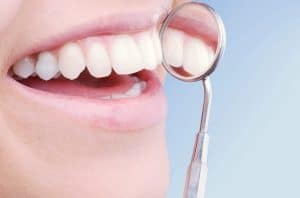 The good news for patients with periodontal disease (or who are at heightened risks for the disease) is that treating and controlling it isn’t usually difficult. With routine care and expert maintenance, you can save your smile from severe damage that often results from severe periodontal (gum) disease. For many patients in Encinitas/San Diego, that maintenance includes the application of advanced Perio Protect – an anti-bacterial solution that you can apply at home to boost your ability to fight gum disease. (more…)
The good news for patients with periodontal disease (or who are at heightened risks for the disease) is that treating and controlling it isn’t usually difficult. With routine care and expert maintenance, you can save your smile from severe damage that often results from severe periodontal (gum) disease. For many patients in Encinitas/San Diego, that maintenance includes the application of advanced Perio Protect – an anti-bacterial solution that you can apply at home to boost your ability to fight gum disease. (more…)
A Brief Look at How Dental Implants Work
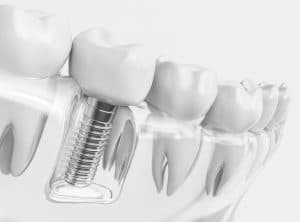 You don’t have to know exactly how every dental treatment you receive works to benefit from it. However, knowing as much as you can about your options will help you ensure that you always choose the best treatment for your specific needs. For example, dental implants are a commonly recommended solution for replacing lost teeth because they provide patients in Encinitas/San Diego with a more stable and comfortable prosthesis. However, it’s the specific way in which dental implants work that make them so effective and why oral health experts typically recommend them. (more…)
You don’t have to know exactly how every dental treatment you receive works to benefit from it. However, knowing as much as you can about your options will help you ensure that you always choose the best treatment for your specific needs. For example, dental implants are a commonly recommended solution for replacing lost teeth because they provide patients in Encinitas/San Diego with a more stable and comfortable prosthesis. However, it’s the specific way in which dental implants work that make them so effective and why oral health experts typically recommend them. (more…)
Diagnosing Your Periodontal Disease
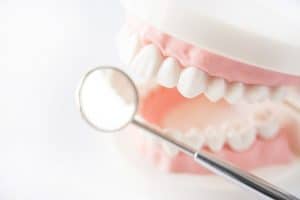 One of the reasons why periodontal (gum) disease affects so many people before they notice it is because the disease occurs in stages. The first, known as gingivitis, doesn’t always produce obvious symptoms, and patients who skip a checkup and cleaning miss the chance for their dentists to more thoroughly check for it. In its more advanced stages, gum disease is often irreversible, which means even after you do notice it and seek treatment, it may be present for the rest of your life. Today, we examine how we help patients in Encinitas/San Diego by diagnosing their specific periodontal disease and designing treatment options specifically for them. (more…)
One of the reasons why periodontal (gum) disease affects so many people before they notice it is because the disease occurs in stages. The first, known as gingivitis, doesn’t always produce obvious symptoms, and patients who skip a checkup and cleaning miss the chance for their dentists to more thoroughly check for it. In its more advanced stages, gum disease is often irreversible, which means even after you do notice it and seek treatment, it may be present for the rest of your life. Today, we examine how we help patients in Encinitas/San Diego by diagnosing their specific periodontal disease and designing treatment options specifically for them. (more…)



